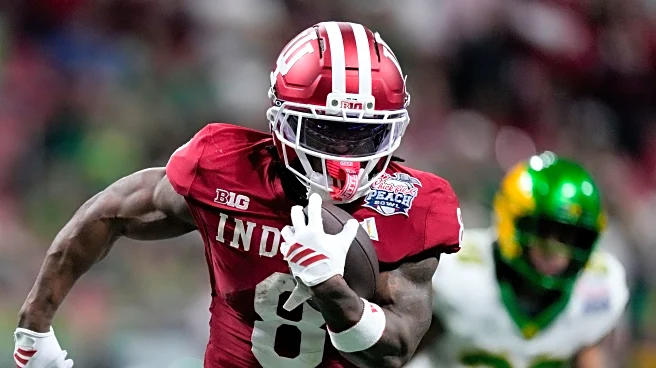What's Happening?
Garrett Wareing, who stars in the film adaptation of Stephen King's novel 'The Long Walk,' discusses his role as Stebbins and the film's themes. The story, set in a dystopian society, follows a group of young men forced to walk until only one remains. Wareing's character, Stebbins, initially isolates himself from the group to increase his chances of winning. However, as the story progresses, he begins to see his fellow walkers as companions rather than adversaries. Wareing explains that this shift in perspective is a key moment for Stebbins, highlighting the film's exploration of camaraderie and the human condition. The film, which has resonated with audiences for decades, delves into themes of masculinity, friendship, and the loss of youth under dire circumstances.
Why It's Important?
The film adaptation of 'The Long Walk' brings to life a story that has captivated readers for nearly half a century. Its exploration of human relationships and societal pressures is particularly relevant in today's world, where themes of isolation and community are increasingly significant. The film's portrayal of a totalitarian society and the characters' struggle for survival and connection offers a poignant commentary on contemporary social issues. For audiences, the film serves as a reminder of the importance of empathy and solidarity in challenging times. The character development and thematic depth provide a rich narrative that encourages viewers to reflect on their own lives and relationships.
What's Next?
As 'The Long Walk' continues to engage audiences, discussions around its themes are likely to persist. The film may inspire further adaptations or explorations of similar narratives in other media. Additionally, the film's success could lead to increased interest in Stephen King's lesser-known works, potentially resulting in more adaptations. For the cast and crew, the film's reception may open up new opportunities in the industry, allowing them to explore diverse roles and projects that challenge societal norms and expectations.
Beyond the Headlines
The film's exploration of a dystopian society raises ethical questions about authority, control, and individual freedom. It prompts viewers to consider the impact of societal structures on personal identity and relationships. The story's focus on male friendships and vulnerability challenges traditional notions of masculinity, offering a more nuanced portrayal of male interactions. This could contribute to broader cultural conversations about gender roles and emotional expression.











